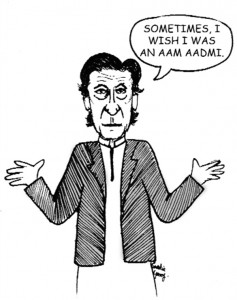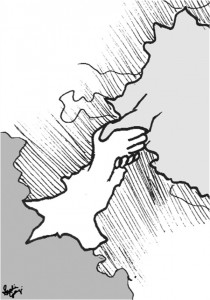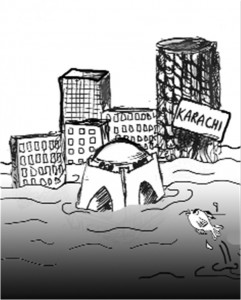
Rocky ride
Sir,
Some days ago, I was in an autorickshaw along with my mother and it broke down on the way. While the rickshaywala was fixing up the problem, he started telling us about himself. He told us that he was an engineer from a renowned university but due to a lack of employment opportunities, he was forced to drive a rickshaw to feed upon his family.
I couldn’t believe my ears. Is this where we are going? Is this what our future is going to be?
I had tears in my eyes and could feel his pain.
Some parents are really poor, but they work so hard just so their children could go to school. But how will they feel when they realize that engineers in our country are driving autorickshaws?
It is such a shame that educated people do not find any jobs, and people who are not qualified get the most privileged posts in this country because of their contacts and affiliations.
Syeda Unzela Mushtaque,
Karachi.
Waiting for Kejriwal

Sir,
The two great political power houses of India suffered a great setback when Aam Aadmai Party (AAP) of Arvind Kejriwal won 67 seats out of 70 in the Delhi Assembly. The last time they won, he made a mistake and resigned within 50 days. And those 50 days were quite hard for them, because of agitation and strikes in favor of an anti-graft bill. Kejriwal and his party deserve appreciation. The Aam Aadmi on the streets of Delhi is now looking forward to the local government addressing his or her problems.
In his first speech after his party’s victory, Kejriwal promised that “Delhi will become the place where the poorest of the poor and the richest of the rich will be proud to live honorably”. He also promised to wipe out corruption. Time will tell if he can fulfill those promises, but it is no ordinary development that the Aam Aadmi Party – only a few years old – has wiped out the century old dynasty of Congress, and brought an early end to the BJP’s honeymoon period.
We have several lessons to learn from this victory, especially the PTI – Pakistan’s newest political party – which has failed to challenge the dynastic politics of the PPP and the PML-N and has begun to lose the popular support it had in the beginning. Pakistani voters are still waiting for a party like AAP and a leader like Kejriwal, and although change is still far away, our vibrant media and social networks are keeping our hopes alive.
Aijaz Ali Khuwaja,
Karachi.
Twins

Sir,
Pakistan and China have a long history of a reliable and time tested friendship. This friendship is based on the principle of equality and respect for mutual interests in all fields of life. Islamabad and Beijing respect each other’s independence, sovereignty and territorial integrity.
Trade between Pakistan and China has a long history. China has constructed projects in Pakistan that are worth billions of dollars, while many more are in the pipeline. Chinese companies have decided to invest in Pakistan’s energy, infrastructure, telecom, mineral exploration and banking sectors. The two countries have signed hundreds of agreements, contracts and memoranda of understandings on close co-operation in the recent past. The most recent memorandum signed by both countries declares the Chinese city of Zhuhai and Pakistan’s Gwadar as ‘twin cities’.
China provides economic aid and military equipment to Pakistan. Any change in Chinese policy and economic conditions would have a great impact on Pakistan’s economy, as China is the major financier of Pakistan’s military and development projects. Pakistan needs China’s help in developing the co-operation in economic projects like trade and energy.
Today, apart from huge amounts of unexplored oil and gas, Pakistan has 185 billion tons of coal reserves, which would be converted into energy to satisfy Pakistan’s growing demands with the help of China. Besides, Pakistan welcomes Chinese experts for exploration of oil and gas. In spite of stiff resistance from New Delhi and Washington, China has agreed to establish two nuclear plants in Pakistan.
Further, the cultural exchanges between China and Pakistan have a long history too. They started more than two thousand years ago. Shortly after the founding of New China in 1949, the two countries established diplomatic ties and have ever since maintained close and friendly cooperative relations in various fields like politics, economy and culture. In literature, quite a few writings from both sides have been translated into each other’s language. In TV and film, a special agreement was signed by the two governments in order to promote cooperation, and in the mid-1980s several TV programs were jointly produced, such as Affection on the Highway which captured the fondness from the people of the two nations.
No matter who becomes the leader of China and Pakistan, this friendship will continue to deepen.
Amna Malik,
Islamabad.
Up in smoke

Sir,
The Ministry of National Health Services, Regulations and Coordination has decided to enlarge the size of the pictorial health warning of smoking on cigarette packs to 85%. Saira Afzal Tarar, the federal minister, claims that Pakistan is the third country to implement an 85% size for the pictorial warning, after Thailand and India.
But what about the imported cigarette packs which are available in market and don’t a have pictorial health warning?
Mubashir Mahmood,
Karachi.
Water woes
Sir,
I want to draw the attention of the authorities towards a monstrous toxic waste canal flowing openly taking all the waste from Faisalabad to river Chenab.
Several studies were carried out and reports were made by the experts, but to no avail. A comprehensive report called ‘City Report of Faisalabad’ was made by Mr Ishfaq Ahmad, District Officer for Solid Waste Management, in 2006. This report was published in a newsletter by the Asian Urban Information Center of Kobe (AUICK) but unfortunately ignored by the authorities.
Another study published in the same newsletter and was conducted by Kishwar Ijaz, associate professor in the Department of Rural Sociology, University of Agriculture Faisalabad. The report gives details of the environmental dangers to Faisalabad owing to untreated waste and its effects on people’s lives.
In the last couple of years, observations that the inhabitants of the surrounding areas of this canals (villages up to 3 km on both sides) have witnessed is that cancer, hepatitis and intestinal diseases have tremendously increased. Samples of underground water were collected from many surrounding villages by the experts, and they suggested that the water is unfit for drinking, as the waste has reached the underground water. It is important to mention here that almost all the houses drink this water directly without any filtration. The deaths in the last couple of years show that many were suffering from hepatitis and cancer.
The experts had suggested that this waste canal should be covered with pipes, and the waste must be treated before it is thrown into the river. The river water is also consumed by animals.
I urge the authorities concerned to take this issue seriously before more people die.
Faisal Latif,
Chiniot.
Pakistan needs you

Sir,
Globalization is a worldwide process of gradual change in all areas of life, including education. Students now prefer to travel abroad for higher education to broaden their horizons. There are hundreds and thousands of Pakistani students who travel abroad each year in order to attain higher education. Every year, nearly 10,000 student visas are granted in Pakistan. But while studying in a foreign country has many advantages, it has some drawbacks too.
According to various reports, there are nearly 10,000 Pakistani students studying in the United Kingdom. Between 2004 and 2008, as many as 42,000 Pakistani students were admitted into the UK. From 2009 to 2012, More than 5,000 students traveled to the United States for studies every year. Several thousand students from Pakistan also go to China every year.
Easy and fast excess to technology has makes people more aware, and everyone is trying to grab opportunities for themselves. But these students forget sometimes that their country needs them too. If they return to Pakistan after they complete their programs and contribute to the Pakistani society and economy, they would help their country develop.
Syeda Shiwal Raza,
Lahore.
Karachi will drown

Sir,
Dr Asif Inam, and eminent Oceanographer and Director General of the National Institute of Oceanography (NIO), in a recent briefing to the Senate Standing Committee on Science and Technology spoke about the possible submerging of Karachi and other coastal districts into the sea by 2060, counting the potential damage that environmental changes could inflict on the country. Unambiguously, it’s a startling and scary disclosure. Dr Asif Inam informed the parliamentary body that some parts of Karachi’s Malir area have already gone under water while Thatta and Badin districts of Sindh will also sink into the water by 2050. Professor Sajid Mir, head of the Senate Standing Committee on Science and Technology, called an urgent meeting to discuss the escalating threat of sea intrusion along the coasts of Balochistan and Sindh, as well as the post and pre-partition status of the islands.
Unfolding facts vis-à-vis this grave issue, Dr Asif Inam further said that during the past 35 years almost two kilometers of coastline near Sindh and Balochistan has submerged into the sea as well as 200,000 acres of land in Sindh. He told the members of the committee that the United Nations Environment Programme and its programme on regional oceans had included Pakistan, in 1989, in the list of countries that could be affected by rising sea levels. Dr Inam cited “abrupt environmental changes, severity in monsoon, and increased flooding” as prime causes of soil erosion and changes in the coastline near Badin and Thatta. “This abrupt change has disturbed the oceanic lifecycle for which data from many areas is unavailable,” he added.
Commenting on the emerging threat, Secretary of Science and Technology Kamran Ali Qureshi said it was an issue of grave significance. Speaking before the panel, Sindh University’s Professor Sarfaraz Hussain Solangi discussed the issues of global warming, climate change and its impact on people. Speaking before the Senate panel, Sindh University Professor Sarfaraz Hussain Solangi said, “We will have to prepare for climate change as the temperature of Karachi will rise by three degrees and that of northern areas by five degrees.” Similarly, he said, as the country’s water table is turning more brackish in certain areas, we should urgently undertake a comprehensive research to sort out this critical issue. An official at Balochistan’s Coastal Development Authority also expressed similar fears and said water in some areas of Balochistan had become brackish.
The scenario painted by these experts is indeed horrifying. But re those at the helm in this country aware of the gravity of the forthcoming catastrophe? Are they taking adequate and substantive measures to deal with this gigantic threat that may engulf the residents of the sprawling city of Karachi and other coastal cities of Sindh in a magnitude beyond our comprehension?
M Fazal Elahi,
Islamabad.
Crime and punishment

Sir,
How can a state, its government and institutions funded by taxpayers justify their existence if 289 citizens are burned alive allegedly by criminals involved in extortion and no criminal investigation and prosecution are carried out because crime and punishment have become tools of political leverage.
There is no statute of limitations on crimes of murder or suspected genocide. How can we allow the savage brutality that has hit Karachi to become a tool in a game of blackmail and concessions? Why is human life so insignificant in Pakistan?
This country was created so that life and property of people could be protected. All state institutions were created to serve the people, and not vice versa.
How can the state with all its fire power and authority expect businessmen and traders to come forward and give evidence against those who demand extortion, when the state itself is hesitant to perform its constitutional obligations.
During Gen Pervez Musharraf’s tenure, extortionists demanded $1 million from a businessman, and the calls were bugged and recorded by an intelligence agency in Karachi. But the culprits were let go after intervention from someone in Islamabad and the gentlemen had to leave this country within 48 hours.
Ali Malik,
Lahore.

